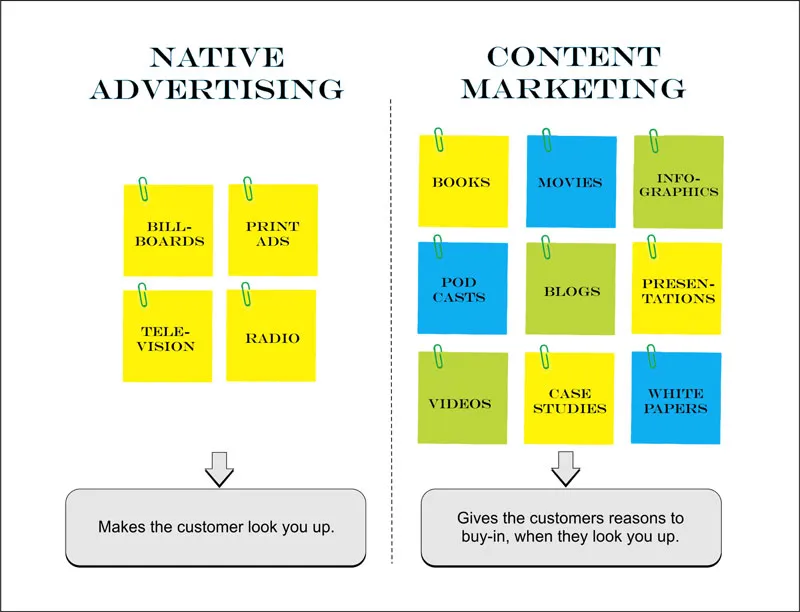What’s the difference between content marketing and native advertising?
Here’s the difference between content marketing and native advertising at a basic scientific level.
Native advertising makes customers look you up.
Content marketing can ‘convert’ the customers who look you up.

That’s as basic as it gets. First up, this article applies to you, if:
- You have product/service that can make a unique claim.
- You are a B2C company.
Your ad agency tells you that 30 crores/year is a good budget to get your brand noticed. They would be absolutely right. You have one crore in hand. Naturally, you are worried.
- What if my campaign gets missed?
- What if the consumer doesn't see what I want to show?
- What if all the money gets spent and nothing happens?
Rule no. 1: Just because advertising is expensive, doesn’t mean that content marketing is going to come any cheap
Here are five great examples of content marketing that will tell you why it doesn’t come cheap.
- The Lego movie – obviously!
- Steve Jobs launching his products: biggest example of content marketing.
- Microsoft stories: have you visited the most persuasive story telling site in modern business history?
- Closer home – remember Kolaveri D? Catchy content that bulldozed language barriers.
- Visit Amul India’s Facebook page for a free MBA on content marketing. Yes, they do native advertising too, but Amul’s content gets shared willingly, at zero cost. Their books compiling decades of content are collector’s items.
Rule no. 2: In content marketing, you own the media. If you’re lucky, other established media will give your content free mileage
So you have one crore in funds and you have set up all your owned content pages; such as your Facebook page, YouTube channel, Blogs, Twitter, LinkedIn, Slideshare channel and even an Instagram account. You also have a media relations team that constantly tells you what kind of content you need to create and where you need to pitch it.
Can you ‘put out’ content in the above mediums that will have ‘shock’, ‘interest’, ‘remark’ value? For content that is so remarkable will mediums with greater media outreach like television and print and online media write about your content free of charge? Will it be shared by people willingly?

You don’t buy any external media; but you spend on strengthening your proprietary pages and channels. Simply put, you may not have enough audience to drive your content program. Therefore, you advertise on social media platforms and work to drive traffic, engagement and conversion into your platform.
Key point – don’t fire on all platforms. Choose what works for you and then build that one.
Rule no. 3: Content marketing and native advertising, both are exact sciences.
There’s a cause–effect relationship between what you do and the outcome you generate. A good campaign takes this into account. Kim Kardashian knows this; and she’s is a great content marketer. If you shock people, they will talk about you.
Pope Francis blessed thousands of Harley riders and their bikes as part of a four-day Roman holiday celebrating the company's 110th anniversary. Harley Davidson, which claims to spend only 15% on traditional media advertising, spends 85% on creating experiences for its customers. When you create ‘communities’ united by experiences, people will talk about you!
You focus on building relationships and appeal directly to the old brain. That’s plain science.
Rule no. 4: It’s always ‘us’ versus ‘them’
You may use technology to standardise a product/service but your customer communication has to be one on one. It has to focus on human beings connecting with other human beings.
Hence, while it is important to be very focused on what you are, it’s equally important to clarify ‘what you’re not’.
Hence, never put out puzzles and ‘low IQ’ contests (what is the colour of a tomato?) on your Facebook page just to have people respond to your post. The people who know what your brand represents, and are choosing to like your page, will disrespect the content you put out and go elsewhere.
Rule no. 5: Nobody is interested. You can keep shouting!
You can’t make people listen! No one’s life changes because you don’t put out your ad. People are really good at ignoring what does not apply to them.
You may be able to figure out who’s likely to listen. Whose life is likely to change because you put out your ad. Your aim is not to entertain people, but to market your product to them in an ‘eyeball-grabbing’ and memorable way.
Content will make its way to an interested audience, provided it has ‘glue-power’.
Shock, connect (hummable tunes), innovation, community value are forms of ‘glue-power.’
In native advertising, which is extremely powerful, provided you have the budget to do it effectively, you are paying someone else to distribute your content. It works just fine, and is extremely valuable, provided it also sticks to the principles of ‘glue-power.’
Both content marketing and native advertising have their own place in the life cycle of a customer-centric organisation. Content marketing also brings in the ‘early adopters,’ who are targeted initially by companies before they launch their native advertising. They subsequently become influencers.







